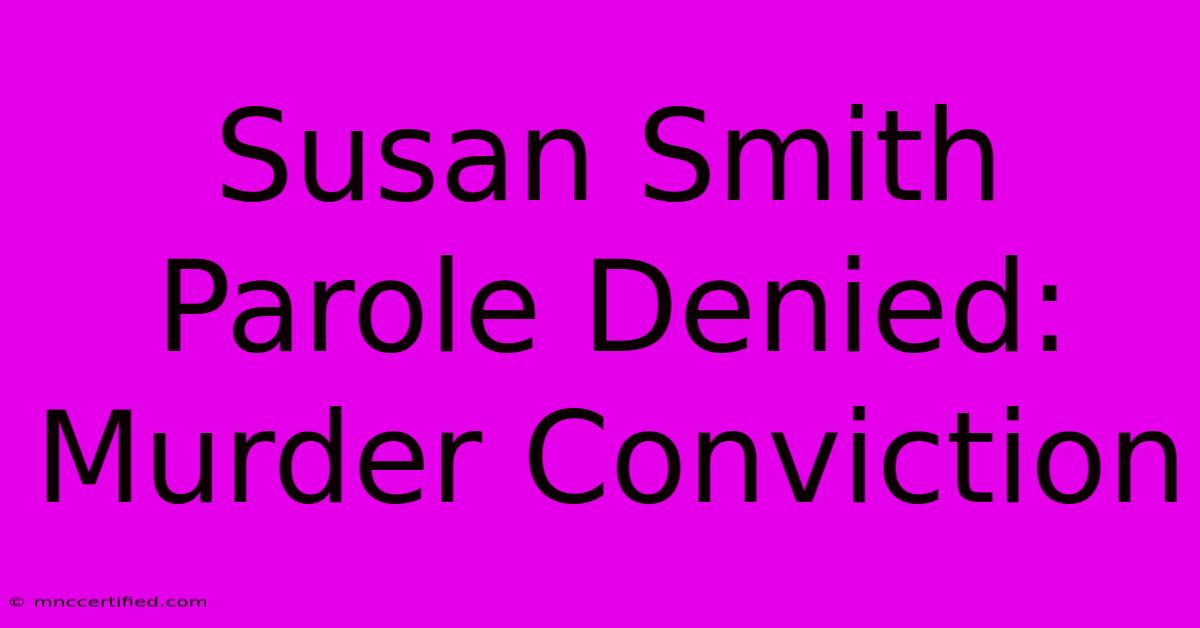Susan Smith Parole Denied: Murder Conviction

Table of Contents
Susan Smith Parole Denied: Murder Conviction Remains
On November 4, 2022, Susan Smith's parole was once again denied, solidifying her continued incarceration for the 1994 murders of her two young sons, 3-year-old Michael and 14-month-old Alex. This decision, while expected by many, reignited public discussion surrounding the case, its lasting impact, and the complexities of justice and forgiveness. This article delves into the details of the denial, examines the ongoing public sentiment, and explores the broader implications of the case.
The Infamous 1994 Murders and Subsequent Trial
Susan Smith's name became synonymous with unimaginable cruelty when, in October 1994, she reported her car stolen with her two sons still inside. A massive search ensued, captivating the nation. Days later, Smith confessed to intentionally rolling her car into a lake, drowning her children. Her motive, she claimed, stemmed from a failed relationship and a desire to escape the responsibilities of motherhood.
The subsequent trial was a media frenzy, exposing the chilling details of the crime and Smith's manipulative behavior. The graphic nature of the crime and the blatant disregard for her children's lives shocked the public. Smith was found guilty of two counts of murder and sentenced to life in prison without the possibility of parole for at least 30 years. This aspect of her sentence – the life sentence without parole eligibility for 30 years – is crucial in understanding the context of her recent parole hearing.
The 2022 Parole Hearing and Denial
Smith's 2022 parole hearing, her first opportunity for release under the terms of her sentence, was met with significant opposition from the public, the victims' families, and law enforcement. Victims' advocates worked tirelessly to ensure her continued incarceration. The South Carolina Department of Probation, Parole and Pardon Services ultimately decided against parole, citing the severity of the crime and the lack of demonstrated rehabilitation. The board emphasized the lasting emotional trauma inflicted upon the families and the community.
Arguments Against Parole: A Lack of Remorse and Rehabilitation?
The argument against parole centered largely on the perception of a lack of genuine remorse from Smith. While Smith has expressed regret over the years, many remain unconvinced of the sincerity of her apologies. Furthermore, the parole board likely considered the lack of evidence demonstrating substantial rehabilitation during her decades of imprisonment. True rehabilitation requires significant introspection, demonstrable change in behavior, and a clear understanding of the devastating consequences of one's actions, all of which seem lacking in Smith's case.
Public Sentiment and Media Coverage
The Susan Smith case continues to resonate deeply within the public consciousness. The case serves as a stark reminder of the destructive power of manipulative behavior and the horrific consequences of violence against children. News outlets covering the parole hearing highlighted the intense public scrutiny and the widespread opposition to her release. Social media platforms were ablaze with discussions about the case, showcasing a strong consensus against granting parole.
The Broader Implications: Justice, Forgiveness, and the Death Penalty
The Susan Smith case fuels ongoing debates surrounding capital punishment. While Smith did not receive the death penalty, her life sentence without parole for 30 years mirrors the outcome many would argue is appropriate. The case underscores the complexities of justice, forgiveness, and rehabilitation, questioning whether lifelong imprisonment is sufficient punishment or whether the death penalty should be considered in such extreme cases. The intense public interest also highlights the enduring power of media coverage and its impact on the judicial process.
Conclusion: A Case That Won't Be Forgotten
Susan Smith's parole denial serves as a powerful reminder of the devastating consequences of extreme violence and the enduring impact of high-profile criminal cases. While the case closed decades ago, the public's unwavering opposition to her release highlights the lasting trauma and the ongoing need for justice. The case will undoubtedly continue to be studied and debated for years to come, raising important questions about the nature of justice, the limits of rehabilitation, and the ever-present shadow of unforgivable acts.

Thank you for visiting our website wich cover about Susan Smith Parole Denied: Murder Conviction. We hope the information provided has been useful to you. Feel free to contact us if you have any questions or need further assistance. See you next time and dont miss to bookmark.
Featured Posts
-
Methanol Poisoning Kills Four In Laos
Nov 21, 2024
-
Insurance On Apartment Buildings
Nov 21, 2024
-
Us Coastal P And C Insurance Company
Nov 21, 2024
-
Aca Health Insurance Jobs Remote
Nov 21, 2024
-
Pet Insurance For French Bulldog
Nov 21, 2024